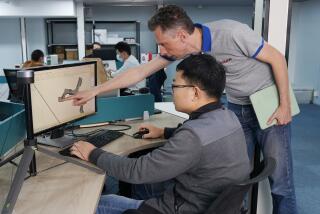U.S. Firms Laying Foundation
- Share via
SHANGHAI — Zhang Jiazhen, director of Shanghai People’s Printing Factory No. 8, already had laid off 400 people, one-third of his payroll, and spent $20 million upgrading his 68-year-old factory, the city’s third-largest.
Despite the actions, unusual in China, Zhang found himself facing a manager’s dilemma of too little cash and expertise to prepare for China’s entry into the World Trade Organization. So he turned to a Western company, Avery Dennison Corp., which provided free instruction in the latest printing techniques and offered to help develop products.
For the record:
12:00 a.m. Oct. 1, 2001 FOR THE RECORD
Los Angeles Times Monday October 1, 2001 Home Edition Part A Part A Page 2 A2 Desk 1 inches; 23 words Type of Material: Correction
Avery Dennison--Captions on two photos of Avery Dennison Corp. executives Dieu Dai Huynh and Li Dagang were inadvertently switched in Sunday’s Business section.
“Avery is the only one in this market offering this kind of training,” said Zhang, a 33-year veteran of the state-owned printing plant, whose customers include Johnson & Johnson, Bristol Myers-Squibb Co. and McDonald’s Corp.
This unusual partnership illustrates the great lengths to which foreign firms such as Avery Dennison are going to secure business in a market that is expected to become much more competitive after the country joins the world’s most powerful trade group early next year.
It’s not enough for the Pasadena-based firm to sell and deliver quality materials at rock-bottom prices. To thrive, foreign companies have discovered they must help their domestic customers survive the restructuring process that will determine who will be the winners and losers in China’s post-WTO economy.
Change won’t be cheap. Since coming to China, Avery, one of the world’s leading producers of pressure-sensitive adhesives and label materials, has invested $30 million in a plant in Kunshan, an hour’s drive from Shanghai, and has announced it will spend $40 million in three new facilities, including a plant under construction in Guangzhou.
Last year, the company opened a printing college at the Kunshan plant equipped with imported up-to-date machinery to provide free training to customers from all over Asia. Avery’s senior engineer, Dieu Dai Huynh, commutes from his home in France to teach the weeklong classes, which are held eight times a year.
This customized service has paid off, said Li Dagang, general manager of Avery’s China operations. Avery, which had $3.9 billion in sales last year, does not disclose revenue by country. But Li said China is Avery’s most profitable and fastest-growing market in Asia. Even with the slowdown in the global economy, sales were up 25% this year.
Employee Loyalty Important in China
When Avery entered the market in 1994, few Chinese had heard of the pressure-sensitive materials it produces, which are turned into such things as diaper tape and shampoo labels. Most Chinese companies still used old-fashioned paper labels.
But Avery knew its multinational customers--companies such as Procter & Gamble Co. and Johnson & Johnson--were betting on huge growth in China’s middle class, which is estimated at more than 200 million people. Avery’s target was the Chinese companies that were their suppliers.
“As people became more aware of the need to meet international standards of quality, we capitalized on that by going to the local companies that were trying to export and educating them on the need for quality in their labeling,” said Christian Simcic, the Avery vice president in charge of global production of pressure-sensitive adhesive materials.
By manufacturing in China, Avery could keep its costs down and provide quick turnaround and personalized service. Though multinationals usually fill their top slots with expatriates, Avery hired Li, a former manager of a state-owned tool plant, and allowed him to fill his 245 positions locally. That cut costs significantly, because expatriates generally demand large compensation packages.
Li pays his staff well by Chinese standards and gives bonuses to top performers. China’s annual per capita income hovers around $1,000, and Avery’s base salaries range from $3,000 to $13,000 a year, depending on the job. Fostering loyalty is particularly important in a country where intellectual property protections are weak and competitors poach staff to gain knowledge of a company’s inner workings.
To protect its brand, Avery maintains tight control over its manufacturing process and imports some of its adhesives rather than risk producing them locally. Last year, Avery won an $80-million jury award in a federal civil case alleging its main competitor, Taiwan’s Four Pillars Enterprise Co., had stolen proprietary information from Avery’s U.S. operation. The defendants have appealed that verdict.
“In any country you have to protect your technology,” Li said. “This is a two-way street. If you trust people, people will pay you back.”
David Xu said he joined Avery China in 1994, after getting an MBA in Australia, because the company valued local knowledge but also offered the sophistication and resources of a multinational operation. “We can grow as the company grows,” said Xu, director of marketing. “Avery uses local people.”
Li takes the notion of personal responsibility seriously and imposes it from the top down.
“If the top-level managers don’t think about cost control, then other employees think ‘Why should we?’ ” he explained. “I ask people to share rooms when they travel, and there’s no unnecessary wining and dining.”
Taking Steps to Shore Up Business
When Avery China’s bad debts started to rise two years ago, Li made the sales staff responsible for collecting payments. If their customers skipped town, the sales commissions were reduced. Keeping tabs on a customer isn’t easy in China because there are few reliable resources for financial information. Salespeople were forced to work the streets to monitor their customers’ fiscal health. Were they paying their bills on time? Were employees unhappy? Should they sell to a company whose reputation was bad? The firm’s bad debts shrank considerably.
During a recent visit to Shanghai People’s Printing Factory No. 8, Li asked the printers about the latest delivery from Avery. When someone complained about a mislabeled roll, the Avery executive asked to see it and scribbled down the tracking number so he could determine where the problem began.
“I can accept one mistake,” he said unhappily. “But this label says no splice and it has a splice. That creates problems for the printer because it runs slower.”
In a city of more than 4,000 printers, 70% of which are private, Shanghai People’s Printing Factory No. 8 faces great pressure to improve its bottom line before it is cut loose by the government. Director Zhang’s goal is to turn his operation into an attractive prospect for a joint venture or to go public. But time is running out.
“Now is a turning point for this company,” he said. “The structure of state-owned companies is coming to an end.”
China’s pending WTO entry has resulted in some positive changes for Avery. The U.S. firm once lost business to Taiwan-made products smuggled in through Hong Kong to evade high tariffs and duties. But in the last year, the Chinese government has begun cracking down on the so-called gray market.
When China officially enters the WTO, tariffs on equipment and imported raw materials used in Avery’s production process are supposed to drop significantly.
With Taiwan slated to join the WTO after China, Li expects to see a dramatic boost in business between the political enemies. Taiwan’s Four Pillars is building a plant on the mainland. But with a new plant coming online in southern China next year, Li will be well-positioned to start selling goods to Taiwan when the barriers come down.
“After China and Taiwan enter the WTO, it will create a much better environment for doing business,” he said.
ABOUT THIS SERIES
This is one of an occasional series on the impact of China’s entry into the World Trade Organization. It will examine social and political issues in California and China, as well as key industries such as agriculture and telecommunications.
Previous: China’s impending WTO entry will mean greater clout, golden opportunities--and loss of millions of jobs.
Previous: California growers worry about making a profit while doing business in China. Meanwhile, Chinese farmers worry they will have difficulty competing with foreign growers.
Previous: The telecommunications industry is like the canary in the mine shaft, an early-warning system for whether China can carry out changes the international community demands as the price of admission to the WTO.
Previous: Once gleeful about the profits to be made from helping feed 1.3 billion Chinese, farmers from California’s lush San Joaquin Valley to the apple orchards of eastern Washington now worry they will be overwhelmed by China’s growing power, particularly once it enters the World Trade Organization.
Previous: South Korea is hurting because of the downturn in exports, but it also is feeling the heat as China becomes a more formidable competitor. The result for South Korea, a mid-level economic power, is that it increasingly finds itself squeezed between Japan, with its technological edge, and China, with its lower costs and wages.
Previous: Because China can produce most of what it needs, foreign firms face a special challenge in entering the new market.
Today: To thrive in China, foreign companies have discovered they must help their domestic customers survive the restructuring process that will determine who will be the winners and losers in the country’s post-WTO economy.
More to Read
Inside the business of entertainment
The Wide Shot brings you news, analysis and insights on everything from streaming wars to production — and what it all means for the future.
You may occasionally receive promotional content from the Los Angeles Times.










